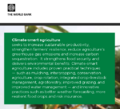Category:United Nations Framework Convention on Climate Change: Difference between revisions
Siterunner (talk | contribs) No edit summary |
Siterunner (talk | contribs) No edit summary |
||
| Line 24: | Line 24: | ||
Precautionary Principle - https://en.wikipedia.org/wiki/Precautionary_principle | Precautionary Principle - https://en.wikipedia.org/wiki/Precautionary_principle | ||
Fields typically concerned by the precautionary principle are the possibility of: | |||
: Global warming or abrupt climate change in general | |||
: Extinction of species | |||
: Introduction of new and potentially harmful products into the environment, threatening biodiversity (e.g., genetically modified organisms) | |||
: Threats to public health, due to new diseases and techniques (e.g., AIDS transmitted through blood transfusion) | |||
: Long-term effects of new technologies (e.g. health concerns regarding radiation from cell phones and other electronics communications devices) | |||
: Persistent or acute pollution (asbestos, endocrine disruptors...) | |||
: Food safety (e.g., Creutzfeldt-Jakob disease) | |||
: Other new biosafety issues (e.g., artificial life, new molecules) | |||
○ ○ ○ ○ | ○ ○ ○ ○ | ||
Revision as of 16:06, 23 August 2015
https://en.wikipedia.org/wiki/United_Nations_Framework_Convention_on_Climate_Change
Secretariat
The work under the UNFCCC is facilitated by a secretariat in Bonn, Germany, which from July 2010 is headed by Executive Secretary Christiana Figueres.
○ ○ ○ ○ ○ ○ ○ ○ ○ ○ ○ ○ ○ ○ ○ ○ ○ ○ ○ ○ ○ ○ ○ ○ ○ ○ ○ ○ ○ ○
http://unfccc.int/essential_background/glossary/items/3666.php
UN FCCC Newsroom - http://newsroom.unfccc.int/
- https://www.facebook.com/UNclimatechange
- https://plus.google.com/+UnfcccInt/posts
- https://twitter.com/unfccc
○ ○ ○ ○
International Institute for Sustainable Development / Comprehensive coverage of UNFCCC meetings
http://www.iisd.ca/process/climate_atm.htm
○ ○ ○ ○
Precautionary Principle - https://en.wikipedia.org/wiki/Precautionary_principle
Fields typically concerned by the precautionary principle are the possibility of:
- Global warming or abrupt climate change in general
- Extinction of species
- Introduction of new and potentially harmful products into the environment, threatening biodiversity (e.g., genetically modified organisms)
- Threats to public health, due to new diseases and techniques (e.g., AIDS transmitted through blood transfusion)
- Long-term effects of new technologies (e.g. health concerns regarding radiation from cell phones and other electronics communications devices)
- Persistent or acute pollution (asbestos, endocrine disruptors...)
- Food safety (e.g., Creutzfeldt-Jakob disease)
- Other new biosafety issues (e.g., artificial life, new molecules)
○ ○ ○ ○
Pages in category "United Nations Framework Convention on Climate Change"
The following 9 pages are in this category, out of 9 total.
Media in category "United Nations Framework Convention on Climate Change"
The following 50 files are in this category, out of 50 total.
- Aquifers global earth observations by grace20150616-16 m.jpg 800 × 450; 117 KB
- Brazil INDC 2015.png 592 × 366; 301 KB
- C40 Cities actions.jpg 1,023 × 696; 174 KB
- Carbon-footprint small or large.jpg 149 × 258; 0 bytes
- Carbon-footprint.jpg 297 × 516; 59 KB
- Citizen science and Climate change m.png 465 × 189; 19 KB
- Climate action m.jpg 443 × 380; 42 KB
- Climate Goals off course - 2018.png 800 × 556; 214 KB
- Climate Plan pledges as Oct6,2015.png 529 × 409; 101 KB
- Climate Smart Agriculture.png 510 × 463; 51 KB
- Climate Time Machine NASA Earth Science.png 981 × 571; 378 KB
- Climatechange infographic.png 529 × 1,719; 122 KB
- ClimateNews 360.jpg 172 × 172; 9 KB
- Earth atmosphere and night 1024x551.jpg 1,024 × 551; 138 KB
- Earth Right Now science.jpg 197 × 49; 3 KB
- Earth science missions in space US circa2017.jpg 800 × 448; 71 KB
- Earth Science Vital Signs, Pulse of the Planet Climate Essentials.png 692 × 441; 207 KB
- Earth's atmosphere 3840x2160.jpg 3,840 × 2,160; 204 KB
- Earth's atmosphere 814x458.jpg 814 × 458; 23 KB
- Earth1 m.png 360 × 341; 194 KB
- EarthRightNow Earth Science satellite fleet circa 2015 m.jpg 495 × 371; 126 KB
- EnvirSecurity.png 558 × 166; 155 KB
- EOS EarthSats s.jpg 743 × 417; 64 KB
- EOSDIS EarthData Jan2015a.png 1,594 × 844; 701 KB
- Eyes on the Earth 2012update.jpg 660 × 310; 115 KB
- Gcf blgrnlogorgb.jpg 500 × 334; 50 KB
- Global Winds b.png 473 × 237; 308 KB
- Good science needs good data .png 579 × 420; 223 KB
- IPCC Report Nov 2, 2014.jpg 513 × 371; 82 KB
- IPCC Report Nov 4 2014 continuing.jpg 715 × 724; 306 KB
- Ipcclogo.jpg 342 × 197; 11 KB
- Isn't it time.jpg 354 × 544; 93 KB
- NASA co2-graph-061219.jpg 800 × 500; 214 KB
- Ocean Heat May 2015.png 714 × 400; 356 KB
- Ocean temps 20013-2012 NASA.png 360 × 745; 247 KB
- OCO-2 March2015.png 811 × 663; 599 KB
- OCO2 Image Dec19, from earlyNov2014 NASA.jpg 980 × 551; 55 KB
- Oco2 nasa.jpg 474 × 259; 108 KB
- The Carbon Dioxide Theory of Climatic Change, by Gilbert Plass, 1956.jpg 798 × 1,202; 397 KB
- There is no plan B because....png 575 × 308; 115 KB
- There is no Planet B (vimeo-2015).png 623 × 337; 80 KB
- Thereisnoplanetb.com .jpg 940 × 198; 48 KB
- ThereIsNoPlanetB.png 589 × 174; 181 KB
- UN Climate Conf Dec2015.png 576 × 182; 42 KB
- UN DecinParis.png 296 × 277; 135 KB
- UNFCCC 21-logo.jpg 720 × 300; 17 KB
- UNFCCC logo.png 336 × 96; 20 KB
- Watching the Planet Breathe3.jpg 1,000 × 405; 290 KB
- Where is global warming.jpg 1,024 × 768; 51 KB
- Wiki IPCC m.jpg 602 × 339; 112 KB








































